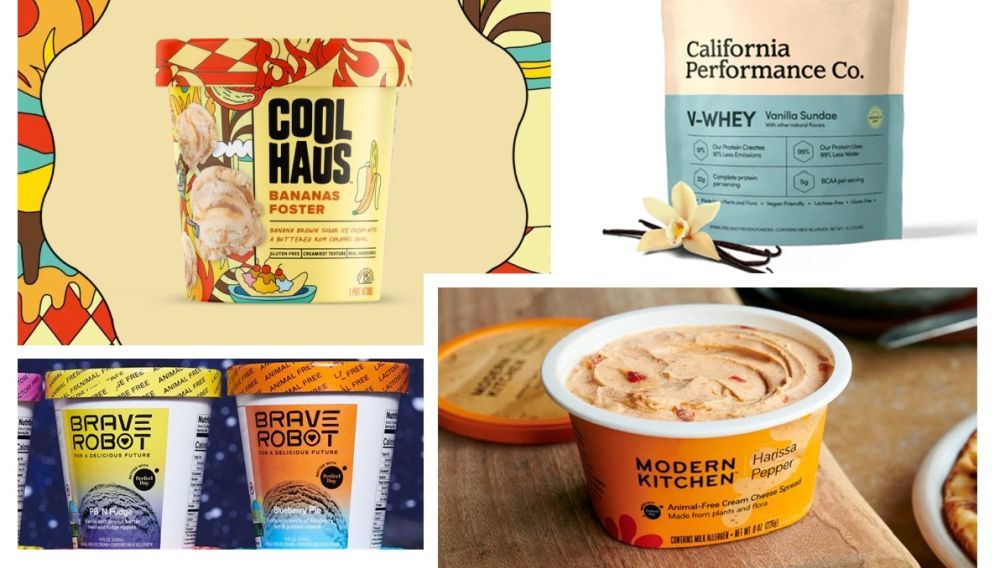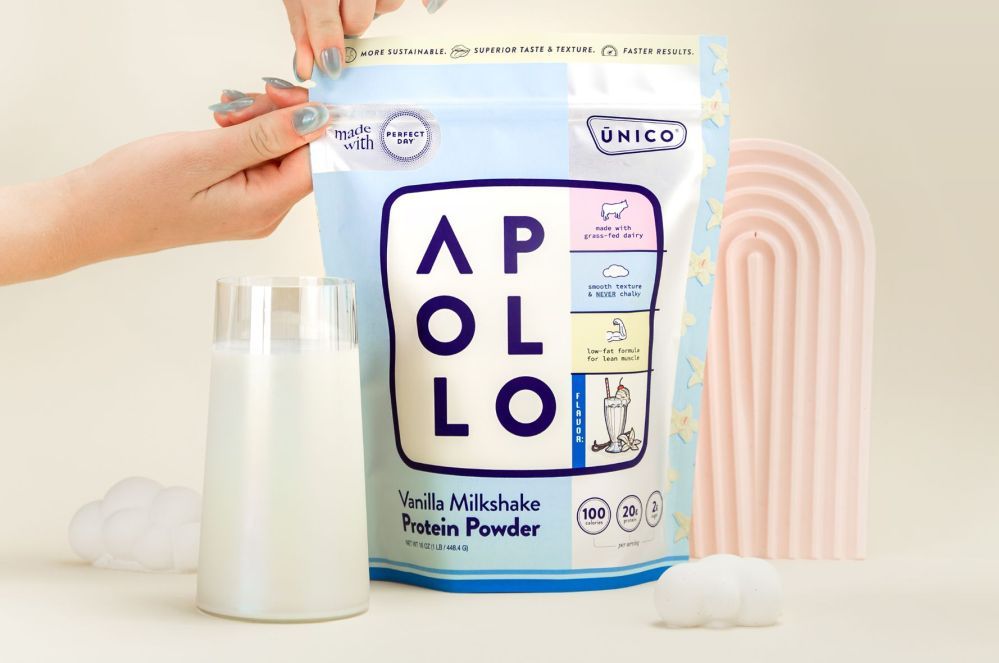Perfect Day plans to sell off its consumer products arm The Urgent Company as a whole or in parts, so it can focus on its core competencies as a b2b supplier of high-value ingredients made via precision fermentation and an enterprise biology firm helping other startups scale up. The move will impact 134 jobs, or 15% of the workforce.
Founded by Ryan Pandya and Perumal Gandhi in 2014 as ‘Muufri,’ Perfect Day initially planned to make ‘animal-free’ dairy milk containing a whey protein (beta-lactoglobulin) made by microbes instead of cows, but ultimately felt it could have a bigger impact by serving as a b2b supplier to the wider food industry.
While its core focus remained b2b, it created The Urgent Company in 2020 to help stimulate market interest in animal-free dairy, building consumer brands including Brave Robot (ice cream and cake mixes), Modern Kitchen (cream cheese), and California Performance Co (sports nutrition products). It went on to acquire Coolhaus in late 2021 with a view to moving the products onto an animal-free platform (although to date only two products have switched).
‘It doesn’t mean that the brands as assets don’t make sense, just that CPG is not our core business’
So why move away from consumer products now? Is this an admission of defeat, or a smart strategic pivot?
According to Pandya, the brands in The Urgent Company’s stable had served their purpose: to kickstart a new category and prove to potential b2b partners that there’s a market for dairy proteins made via fermentation, a novel concept for consumers.
“It doesn’t mean that the brands as assets don’t make sense, just that CPG is not our core business,” he told AgFunder News (AFN). “There are interested parties that we are talking to for a potential path forward for The Urgent Company. We’re talking to CPG companies and financial buyers that are interested either in the whole business or individual brands. Someone who’s dedicated to building consumer businesses is going to be able to do more with these brands.”
He added: “We’ve known since day one that the needs of a consumer business are fundamentally different than the needs of an innovation based and partnership b2b based business. But the math was different in 2020 when we needed to kickstart the category and the precision fermentation industry as a whole to catalyze the kind of collaborations with bigger companies that truly drive scale.
“Moving forward, our consumer business is no longer needed as a flywheel for our b2b business, and every dollar that we raise or earn should go into our core.”
Layoffs for 15% of workforce
According to the company, 15% of its workforce was laid off earlier this month: “134 individuals were impacted globally as part of our efforts to more deeply focus our business. While the majority of those affected were impacted due to Perfect Day’s transition away from B2C, we also made the difficult decision to further realign certain aspects of our business to best meet our near- and long-term goals.”

Partnerships with ‘household names’ to be announced shortly
According to Pandya, who has raised $750 million over the past few years from backers including Disney CEO Bob Iger, Horizons Ventures, ADM Ventures and Temasek, “The Urgent Company has shown the bigger players that this technology is ready [for prime time]. Brands like Brave Robot have noticeably changed how big companies view Perfect Day as a supplier and led to a step change in the amount of interest and the speed and intensity of that interest from our b2b partners.”
Recently, he claimed, retailers had been talking to Perfect Day about replacing brands developed by The Urgent Company with new brands also featuring Perfect Day’s whey protein developed by bigger companies with more CPG experience.
While potentially losing shelf space is not something you might expect any company to shout about, “The idea that we might have unlocked shelf space [with The Urgent Company] and gotten a retailer interested, and then they come to us and say, Can we give this space to a larger company [that is also using Perfect Day’s animal-free whey]? That’s very interesting to us.”
He added: “There are a couple [of collaborations with big CPG players] that that we’re just shy of being able to announce, but we’re talking about multinationals with household name brands that we’re going to be partnering with in the coming months.”

Big CPG and animal-free dairy
The first products launched by large CPG companies utilizing Perfect Day’s whey protein include CO2COA animal-free dairy chocolate from Mars (now discontinued), Cowabunga animal-free beverages from Nestlé (tested in a handful of stores), and Bold Cultr animal-free cream cheese from General Mills (recently dropped). Starbucks has also tested animal-free milks, but has not said anything publicly about their performance.
So what, if anything, does their success (or lack, thereof) tell us about the broader potential for dairy from microbial fermentation? And were these arguably niche propositions the best vehicles for testing the waters?
It makes sense that multinational partners would not risk their core brands in the first instance, said Pandya. “The potential to use ingredients like ours to meet some of these companies’ ESG goals is massive, but I think with these initial launches were designed as much to evaluate us as a potential supplier as to gain consumer insights. Can we hit quality requirements? Can we ship on time? Now that we’ve checked those boxes, we’re having a different kind of conversation.”
By moving away from ‘animal-free’ messaging to ‘whey protein from fermentation,‘ meanwhile, Perfect Day is now having more conversations with companies looking to reduce their carbon footprint and meet sustainability targets without necessarily going 100% animal-free, he said.
“What you’ll notice about our new partnership with Unico Nutrition is that they are launching a hybrid product combining whey protein from cows and our whey protein from fermentation. This probably wouldn’t have happened a couple of years ago when it was all about animal-free products, but when you look at things from an ESG lens, it doesn’t have to be all or nothing.”

The economics of precision fermentation
To those querying the economics of precision fermentation to make dairy proteins, Pandya said: “We’re able to produce whey at a cost that was thought impossible 10 years ago, and we’re still only scratching the surface of what the biology is capable of.
“For precision fermentation more generally, the grams per liter that these organisms are making continues to be nowhere near the biological maximum, and then things like continuous processes will potentially help improve the economics even more.”
That said, right now, whey is certainly more economically viable than casein to produce via precision fermentation, he observed. “The challenge with casein is that it’s a lower value protein than whey, currently.”
As for manufacturing, he said: “We’re still working entirely with third parties, but we have a couple of different options that we’re evaluating to be able to get to that larger scale. And that is really where I think a lot of our focus is going to be over the next couple of months, and frankly, the next couple of years, to really unlock much larger capacity than is possible with contract manufacturers.”
The innovation pipeline
Asked about the innovation pipeline, he said: “Some of the early and interesting opportunities we looked at were in dairy, but the potential for the precision fermentation industry goes far wider.
“And so in cases where we might not have a client yet through [Perfect Day’s enterprise biology arm] nth bio that are interested in a molecule that we think is of interest, we might put that into our pipeline directly.
“One category we’re looking at is animal proteins that we can make in a more sustainable way. The other is plant materials where it’s not economically viable to extract them from plants because they’re present in such small quantities or it’s too energy and resource intensive to be viable.”




